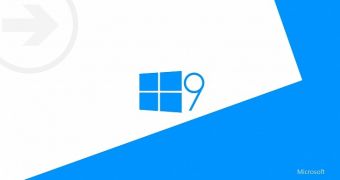Windows 8.1 Update is already up for grabs, a second update is on its way and still, many eyes are on Windows 9, the next full version of Windows that could see daylight in early 2015.
Everyone expects Windows 9 to bring a dramatic change in terms of looks and performance, with some users explaining that they're even delaying the switch to a modern operating system until the next full Windows build comes out.
Basically, there are two big reasons why Windows 9 is expected to be a game change for Microsoft and its users, and there's no doubt that it really has to meet expectations in order to help the Redmond-based software giant maintain its hefty market share on the desktop.
First of all, people want Windows 9 to represent a major makeover on the desktop especially due to the slow adoption of Windows 8 which, in its turn, was caused by the UI changes implemented by Microsoft and the lack of a Start menu. Many complained that without a Start menu, it's very difficult to get around the operating system, so Windows 9 could fix all of these.
Word is that Windows 9 might be the one to bring back the Start menu, but also some other features, such as the addition of Cortana, Microsoft's very own personal assistant that's currently available on Windows Phone 8.1.
The second reason concerns the way Microsoft is projected to address the touch-optimized environment. In Windows 8, the company forced everyone to use some features that were mostly aimed at tablets and touch-capable devices, such as the Start screen, but things could change when Windows 9 comes out.
Microsoft is working to mix the desktop and the Modern UI and the company might not only bring a Start menu to make the Start screen less less of a necessity on a PC, but also options to launch Metro apps on the desktop.
What's more, the idea of convergence is becoming a priority, as Microsoft is trying to offer the exact same experience across multiple devices, including tablets, PCs, and smartphones.
Word is that the company is even working on a freeware version of Windows 9 that would be specifically designed for ARM devices, again in an attempt to boost adoption of the operating system and bring cheaper devices to the market. This doesn't guarantee that Windows 9 could quickly become a hit, but at least it'a a way to attract more buyers.
As you can see, things are very likely to change significantly as compared to what happened in Windows 8's case, so it might seem like Microsoft has more or less learned from its mistakes. It remains to be seen however if users are still willing to give modern Windows a try after many expressed their disappointment towards Windows 8.

 14 DAY TRIAL //
14 DAY TRIAL //